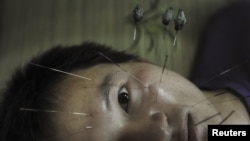HONG KONG —
The origins of traditional medicine in Asia, Africa and the Americas can be traced back thousands of years. A successful history of traditional disease prevention and treatment has been viewed with skepticism by contemporary scientists. But such views seem to be changing.
The World Health Organization is meeting in Hong Kong as preparations continue to update a global strategy for traditional medicine first outlined in 2001.
One fifth of the world’s population is believed to rely on traditional healthcare. According to WHO figures, 119 countries have developed regulatory frameworks for traditional medicine - or TM.
Dr. Zhang Qi is coordinator of the Geneva-based agency's traditional and complementary medicine unit.
“This shows we should recognize the existence and harness the potential of TM [traditional medicine] to contribute to healthcare. We also [need to] ensure the safety, quality and effectiveness of TM for the public," he said.
While contemporary clinical science has tended to be skeptical about traditional medicine, the reality, says Professor Rudolf Bauer, is that more than one-third of so-called “modern” medicines are still derived from plants. Another third are modeled on plant structures.
“The future goal could be some kind of integrated medicine using both traditional and Western medicine to select the best [treatments] for patients," he said.
The head of the University of Graz Institute of Pharmaceutical Sciences, Bauer says modern medicine appears to be adopting successful methodologies from its older counterpart.
“TM is not usually one drug for millions of people, but individual mixtures of different herbs to best treat single patients. This concept of personalized medicine is a very hot topic in Western medicine, especially in cancer treatment. We realized we need more individualized therapies - and this has been the case in TM for hundreds, even thousands of years," he said.
Most experts agree the adoption of traditional medicine is going to rise. Yale University Professor of Pharmacology Dr. Yung-chi Cheng is at the vanguard of modern medical research, inventing widely-used therapies for diseases including cancer, hepatitis, and HIV.
In 1999, Cheng began exploring the overlap between traditional and contemporary medicine. Recently he and his colleagues licensed a compound - PHY906 - to improve treatment outcomes and help relieve the pain of cancer patients undergoing chemotherapy.
“This formula consists of four herbs using exactly the same composition described 1,800 years ago in a classic Chinese medicine book. I call this ‘poly-chemical medicine’ because it has multiple chemicals. Today you and I use single-chemical medicines. This paradigm will evolve to become the cornerstone of future medicine," he said.
The future looks healthy for traditional medicine, although investment will be required.
In Hong Kong, where the WHO meeting is taking place, 30 percent of the population already uses traditional treatments.
While the Health Department was not prepared to speak to VOA, the new government of the semi-autonomous Chinese city has reiterated its commitment to make traditional medicine one of “six emerging pillar industries.”
As representative for 300 traditional medicine producers of the Chinese Manufacturers’ Association, Joseph Lau is not persuaded. He notes the government does not even keep import and export data for the industry.
“I think the government is not doing enough to promote traditional medicine. Over the years they have passed several laws to regulate production. As a manufacturer, it makes our life a lot harder. But this is a necessary step we have to go through," he said.
The China Daily newspaper observed in September that more investment is required for Hong Kong to emerge as a regional TM hub and challenge the Japanese and Korean manufacturers that control 90 percent of the market.
While regulatory frameworks are expanding and improving, concerns about TM quality persist. This year, European authorities have issued several warnings on potential contamination of traditional medicines from Hong Kong and China.
Nonetheless, from a clinical perspective, the testing of new medicines is becoming increasingly rigorous and the credibility of traditional medicine increasingly robust, observes Dr. Cheng.
“I am a mainstream scientist. I know what the concerns are. Many people take a rejectionist approach to TM. But nowadays evidence and hard science are coming along - many people are starting to consider the possibilities, and I think the mood is changing," he said.
As the modernization of ancient healthcare practices continues, the World Health Organization expects to implement its forthcoming 10-year global strategy for traditional medicine by 2014.




